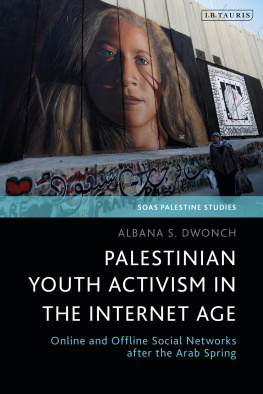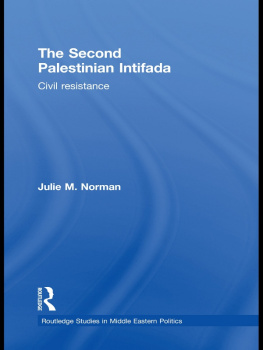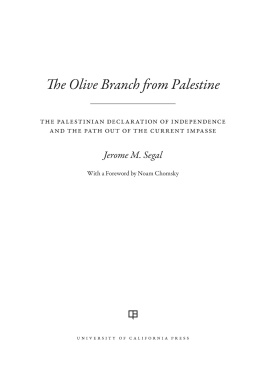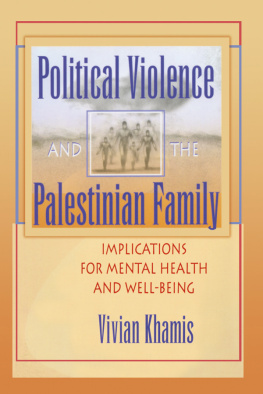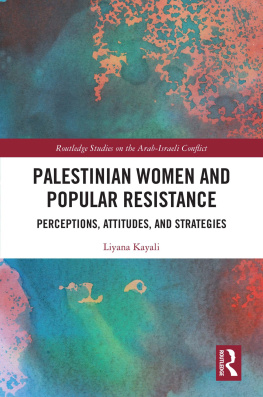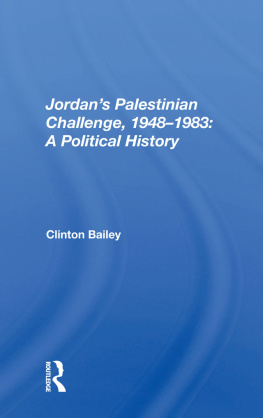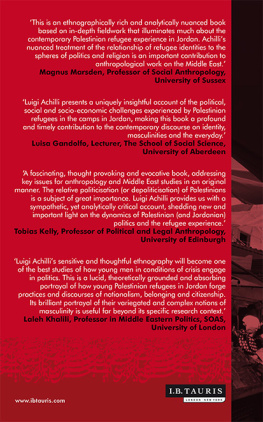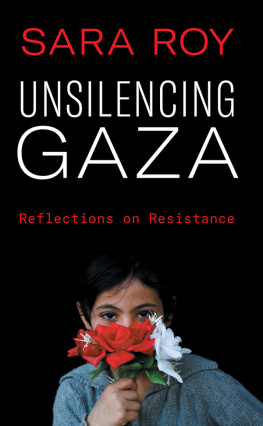Palestinian Youth Activism in the Internet Age
SOAS Palestine Studies
This book series aims at promoting innovative research in the study of Palestine, Palestinians and the Israel-Palestine conflict as a crucial component of Middle Eastern and world politics. The first ever Western academic series entirely dedicated to this topic, SOAS Palestine Studies draws from a variety of disciplinary fields, including history, politics, media, visual arts, social anthropology, and development studies. The series is published under the academic direction of the Centre for Palestine Studies (CPS) at the London Middle East Institute (LMEI) of SOAS, University of London.
Series Editor
Gilbert Achcar, Professor of Development Studies and International Relations at SOAS, Chair of the Centre for Palestine Studies
Board Advisor
Hassan Hakimian, Director of the London Middle East Institute at SOAS
Current and Forthcoming Titles
Palestine Ltd.: Neoliberalism and Nationalism in the Occupied Territory , Toufic Haddad
Palestinian Literature in Exile: Gender, Aesthetics and Resistance in the Short Story , Joseph R. Farag
Palestinian Citizens of Israel: Power, Resistance and the Struggle for Space , Sharri Plonski
To my Mom and Dad,
with love and gratitude.
Palestinian Youth Activism in the Internet Age
Online and Offline Social Networks after the Arab Spring
Albana S. Dwonch

Contents
I would like to express my gratitude and appreciation to the many people who have inspired and supported me in this project. While parts of this writing journey were grueling and lonely, others were reassuring, enlightening, and invigorating, particularly those times when I felt the presence of an incredible team of people supporting me, in so many different ways. I want to acknowledge my deep gratitude and thanks to many of them for their support while I labored through this study.
First, this book would not have been written or even conceived of, were it not for the many activists in Gaza, the West Bank, East Jerusalem, and inside of Israel who gave willingly of their time and insights for the many questions and topics that this study sought to address. Some of them asked that I not mention their names here, but they know who they are. They supported me every time I asked for help, doing interviews and encouraging others to do them for their sake. I particularly want to thank Jehane El Farra, Heba Hayek, and Reem Omran. Their help with collecting data about patterns of Palestinian youth engagement online was crucial to get me started. Moheeb Shaath, in Gaza, was an incredible source of support while writing the Gaza chapter. Issa Amro in Hebron, with his passion for Palestinian human rights and his life dedicated to nonviolent resistance, remained inspirational throughout my fieldwork in Israel and Palestine. Their willingness to extend their personal and work connections to me allowed me to conduct interviews with some activists I did not know personally, but who proved very important to my writing afterward. This book is really about efforts of people like these named and other unnamed individuals, who, despite the difficulties in their own lives, when given the chance, did what they thought was rightfor themselves and their community. I hope that one day I will be able to return the gesture of friendship and kindness that each has shown to me.
When I decided to alter the professional trajectory of my life, switching from the NGO world and leaving behind a career I was passionate about, to enter the world of academia, no one warned me about the dangers that come with such Leaps of Faith. I am grateful to my previous organization, Mercy Corps, and its people, which offered me opportunities to travel the world and observe, in person, the realities of youth growing up in a highly unstable region, the Middle East. Along that journey, I made long-lasting friendships and learned a great deal. Above all, the most valuable NGO lesson that served me in this writing endeavor is that the projects, ideas, and plans that you passionately write up on paper take on a life of their own when implementing them on the ground. You can only take it a day at a time and do your best with and for the people that happen to be with you on that particular journey. I owe my special thanks to David Holdridge, who has supported me from day one, when we first met in Iraq, and who has since become a mentor and good friend.
I want to take this opportunity to thank each of my committee members at the University of Washington, for allowing me to find my own way to combine all these separate strands of my life into a meaningful scholarly work. Joel Migdal has been an inspiring force in this journey, as a scholar, a teacher, and my closest advisor. His unique way of expecting high standards of academic work, while demonstrating empathy, patience, and respect for his students and their work, has had a significant impact on the professor I hope to one day become. Though his scholarly work influenced the way I approached my research, he never pushed me one way or another in writing of this book. Instead, he let me follow my own instincts and passion to guide my research focus. Particularly, during my fieldwork in Israel and Palestine, his ability to help me sort through a myriad of interesting facts and fascinating interviews helped me create a meaningful thesis.
I owe a particular debt of gratitude to Philip Howard, whose writing and literature advice helped shape the theoretical framework of my thesis. Phil believed in my ability to get this book written and encouraged me even in the moments when I most doubted myself. My Skype meetings with him have been crucial in helping me see and appreciate my own accomplishments and in encouraging me to look at the bigger picture when I was stuck in the weeds. Sabine Lang has been a friend and a close confidante in this journey. I have come to admire and deeply respect her natural ability for equal relations that are both highly professional and mutually respectful and trustworthy with her colleagues and graduate students. Resat Kasaba has always shown keen interest and candid support to my work. He embraced my background and my combination of experiences and aspirations from our very first meeting together. Ali Jarbawi has been a consistent source of support, every time I asked for help or advice, during and particularly after my fieldwork in Palestine. My time as a visiting researcher at Ibrahim Abu Lughod Institute of International Studies, at Birzeit University, was invaluable. In Jerusalem, I was affiliated with PASSIA (The Palestinian Academic Society for the Study of International Affairs) which opened its door, library, academic advice and support on a regular basis during my stay in the country. Thank you all for your wonderful support and partnership on this journey!
I also wanted to thank a group of friends and fellow PhD students who helped me with different forms of support, including reading chapters and providing valuable suggestions and comments: Jim Rzegocki, Michael Degerald, Ayse Nal, Filiz Kahraman, Jessica Beyer, and Jean Rogers.
Last, but not least, I would like to thank my amazing husband, Andy, my first reader and editor, my most loyal friend, with whom I lived both through the disappointments and anxieties of some battles lost and through the love and gratitude of others that were won. I could not have finished a demanding PhD course of study and written a book without his never-ending emotional and intellectual support. Throughout this journey, he has been the first to show belief in my ability and the first to assure me that no matter what, at the end of the race, he would be there with me. My children, Emma and Josh, have been my daily reminder of what truly matters in life. Every day they have asked with sincerity and concern about my studies and my writing. The curiosity, joy and enthusiasm, with which they live every day, have helped me learn and grow more than writing this book could ever have. For that, I will be forever grateful!

